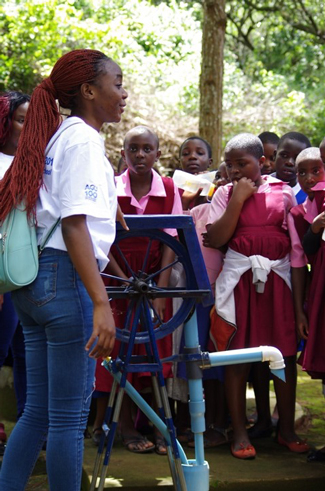There is a gap in research in science, technology, engineering, and mathematics (STEM) addressing long-term development and economic drivers in sub-Saharan Africa [Blom et al., 2016]. The gap in STEM starts early in Malawi’s educational system: There are no science and technology books or teacher guides available until 4th grade [Ministry of Education, Science and Technology, 2016]. In Malawi, high-income households have a disproportionate share of seats in higher education institutions [Castel et al., 2010]. Few girls, especially those from poorer families, are encouraged to pursue sciences, and the repercussions of that can be seen in STEM career fields. Only 11% of the Ministry of Water technical and engineering government staff are female [Mwamsamali and Mayo, 2014]. I am excited to have received an AGU Celebrate 100 Grant, part of AGU’s Centennial programming, to celebrate and ensure greater diversity in the Earth and space sciences in Malawi.

.
STEM at Mzuzu University
We are using our Celebrate 100 Grant to support a series of Girls Science Day camps.
Clearly, there is a need to encourage rural girls in Malawi to pursue STEM fields. Mzuzu University is located in the northern region of Malawi, awarding bachelor’s, master’s, and doctoral degrees. Part of its mission is to bridge this gap to higher education. Our STEM research at Mzuzu is focused on practical applications in water systems, sanitation, and hygiene interventions serving rural and vulnerable people. Our work offers a unique opportunity to pair students and faculty with elementary and middle school girls, to guide and mentor them to become trained STEM professionals in the next generation.
We are using our Celebrate 100 Grant to support a series of Girls Science Day camps—we held the first camp on 19 January. Our goal is to motivate 400 elementary and middle school girls to stay in school and to make a career in science seem like a fun and possible option. I was able to show these girls our university facilities and share the impact of our science on their community.

STEM in Malawi for Local Solutions
Many areas of Malawi still lack water infrastructure. The last published census in 2008 showed that about half the population relies on hand pumps that tap into groundwater to get drinking water. In the northern region of Malawi, we have limited groundwater data because of a lack of trained technicians and shortage of laboratory infrastructure [Holm et al., 2018].
At the first girls’ science camp, we talked about water quality, why it is important, and why we get sick when our drinking water is contaminated. Then the girls performed an analysis of water brought from their own homes, using simple water quality field kits from our research programs. They measured total coliform, Escherichia coli, pH, and salinity.
Another community challenge is the lack of infrastructure for regular handwashing. The girls at the camp learned how to overcome this hurdle by reusing local plastic bottles, bottle caps, and a piece of soap to make a handwashing station that they could recreate at their home. Not only is this hands-on activity fun for all the girls, but it allows us to encourage critical thinking and using what is available to make local STEM solutions.
References
Blom, A., G. Lan, and M. Adil (2016), Sub-Saharan African Science, Technology, Engineering, and Mathematics Research: A Decade of Development, World Bank, Washington, D.C., https://openknowledge.worldbank.org/handle/10986/23142.
Castel, V., M. Phiri, and M. Stampin (2010), Education and Employment in Malawi, Work. Pap. Ser., vol. 110, Afr. Dev. Bank, Tunis.
Holm, R. H., G. Kunkel, and L. Nyirenda (2018), A thought leadership piece: Where are the rural groundwater quality data for the assessment of health risks in northern Malawi?, Groundwater Sustainable Dev., 7, 157–163, https://doi.org/10.1016/j.gsd.2018.05.004.
Ministry of Education, Science and Technology (2016), Education statistics bulletin, Lilongwe, Malawi.
Mwamsamali, O. K. K., and A. W. Mayo (2014), Gender mainstreaming in integrated rural water supply and sanitation project in Mzimba, Malawi, J. Water Sanit. Hyg. Dev., 4(2), 293—203, https://doi.org/10.2166/washdev.2014.111.
—Rochelle H. Holm ([email protected]), Centre of Excellence in Water and Sanitation, Mzuzu University, Malawi
Citation:
Holm, R. H. (2019), Encouraging African research for the next generation, Eos, 100, https://doi.org/10.1029/2019EO115891. Published on 11 February 2019.
Text © 2019. The authors. CC BY-NC-ND 3.0
Except where otherwise noted, images are subject to copyright. Any reuse without express permission from the copyright owner is prohibited.

